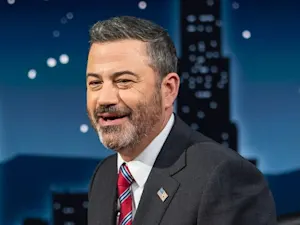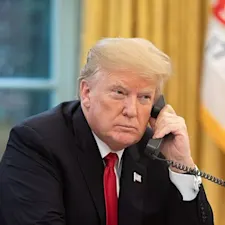
Republicans Fearing 'Bloodbath' in 2026
Trump showing a chart with reciprocal tariffs. Photo courtesy of The White House. Public domain.
Republicans are sweating — not because of the D.C. heat, but because President Donald Trump's sweeping tariffs might scorch their chances in 2026. As the trade war churns up economic uncertainty, behind closed doors, GOP lawmakers are whispering what many dare not say out loud — this might cost them everything.
Even Trump loyalists are getting nervous. And while the president insists it's all part of his brilliant plan, more and more Republicans are starting to fear they'll be the ones picking up the political pieces — not Trump.
The Fear Behind the MAGA Smile
Outwardly, the GOP is toeing the line. Publicly, many lawmakers back Trump's aggressive trade push — or at least avoid contradicting it. The protectionist wing of the Republican Party — led by voices like right-leaning think tank American Compass founder Oren Cass — views Trump's trade war as a long-overdue reckoning with globalization. They see the tariffs as bold and necessary.
But behind the scenes, aides and strategists are ringing alarm bells. Some even compare the current moment to 1932 or 1982 — when Republican-backed economic policies led to punishing midterm losses. In comments reported by The Hill, Sen. Thom Tillis (R-NC) said, "No doubt, if we're having the same discussions about tariffs in February of next year, all the indicators would be 'wrong track.' They've got about 10 months to wrap a bow around this and say, 'See, I told you so,' or you're going to start seeing political headwinds."
In comments reported by USA TODAY, Tillis also said, "Whose throat do I get to choke if this proves to be wrong?"
Even Cass admits that the political damage could be catastrophic if the results don't come soon. In a statement to Politico, he said, "I don't think there is a problem with doing things that have costs. The problem is with failing to properly communicate the nexus between the problem to be solved and costs to be borne. A plan done poorly that imposes politically unsustainable costs, and therefore loses favor with the public, obviously undermines the long-term goal of effecting this kind of change."
The stakes are high. The economy — Trump's signature campaign issue — is now volatile. Markets are jittery, prices are climbing, and GOP donors are calling in with complaints. Even Trump's own approval ratings took a 5-point hit in an Economist/YouGov poll after the tariffs were announced, as reported by The Hill.
A Public Show, A Private Rebellion
Not all Republican lawmakers are keeping their worries private. Sen. Rand Paul (R-KY) cited the 1930 Smoot-Hawley Tariff Act — legislation many economists blame for worsening the Great Depression — as a potential harbinger of what's to come.
Sen. Ted Cruz (R-Texas) struck a similar chord, calling the situation a potential "bloodbath" if the economy slides into recession, according to USA TODAY.
But even as they raise concerns, many of these lawmakers have stopped short of outright defiance. Trump's grip on the party remains tight. His threats — sometimes mocking, sometimes veiled — have made clear that anyone who steps out of line could find themselves the target of a presidential tirade, a primary challenge, or both.
The Clock Is Ticking
There's no consensus on how much time the GOP has before the political fallout becomes irreversible. Some strategists believe public opinion could harden by summer. Others say February 2026 is the real deadline.
Either way, Republicans find themselves caught between a rock and a hard place: support a deeply polarizing policy and risk electoral collapse — or oppose Trump and face the wrath of a base that sees him as their champion.
References: Republicans fear Trump's trade war could lead to political wipeout | If Trump's Trade War Implodes, It May Be Knives Out for Republican Populists | Trump tariffs caused a market meltdown. Could they sink the GOP's political fortunes, too? | GOP Pushback on Trump Tariffs Was Getting Louder Before Pause























